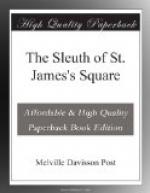My father used to say that the great orders of God were correct in this humility; for in its vast, comprehensive action, the justice of God moved in a great plain, where every indicatory event was precisely equal; a straw was a weaver’s beam.
God hailed men to ruin in his court, not with spectacular devices, but by means of some homely, common thing, as though to abase and overcome our pride.
My father moved the sheets of foolscap, and tested the point of the quill pen like one who considers with deliberation. He dipped the point into the inkpot and slowly wrote a dozen formal words.
Then he stopped and put down the pen.
“The contests of the courts,” he said, “are usually on the question of identity. I ought to see this slave for a correct description.”
The two men seemed for a moment uncertain what to do.
Then Zindorf addressed my father.
“Pendleton,” he said, “the fortunes of life change, and the ideas suited to one status are ridiculous in another. Ordez was a fool. He made believe to this girl a future that he never intended, and she is under the glamor of these fancies.”
He stood in the posture of a monk, and he spoke each word with a clear enunciation.
“It is a very delicate affair, to bring this girl out of the extravagances with which Ordez filled her idle head, and not be brutal in it. We must conduct the thing with tact, and we will ask you, Pendleton, to observe the courtesies of our pretension.”
When he had finished, he flung a door open and went down a stairway. For a time my father heard his footsteps, echoing, like those of a priest in the under chambers of a chapel. Then he ascended, and my father was astonished.
He came with a young girl on his arm, as in the ceremony of marriage sometimes the priest emerges with the bride. The girl was young and of a Spanish beauty. She was all in white with blossoms in her hair. And she was radiant, my father said, as in the glory of some happy contemplation. There was no slave like this on the block in Virginia. Young girls like this, my father had seen in Havana in the houses of Spanish Grandees.
“This is Mr. Pendleton, our neighbor,” Zindorf said. “He comes to offer you his felicitations.”
The girl made a little formal curtsy.
“When my father returns,” she said in a queer, liquid accent, “he will thank you, Meester Pendleton; just now he is on a journey.”
And she gave her hand to Lucian Morrow to kiss, like a lady of the time. Then Zindorf, mincing his big step, led her out.
And my father stood behind the table in the enclosure of the window, with his arms folded, and his chin lifted above his great black stock. I know how my father looked, for I have seen him stand like that before moving factors in great events, when he intended, at a certain cue, to enter.
He said that it was at this point that Mr. Lucian Morrow’s early comment on Zindorf seemed, all at once, to discover the nature of this whole affair. He said that suddenly, with a range of vision like the great figures in the Pentateuch, he saw how things right and true would work out backward into abominations, if, by any chance, the virtue of God in events were displaced!




